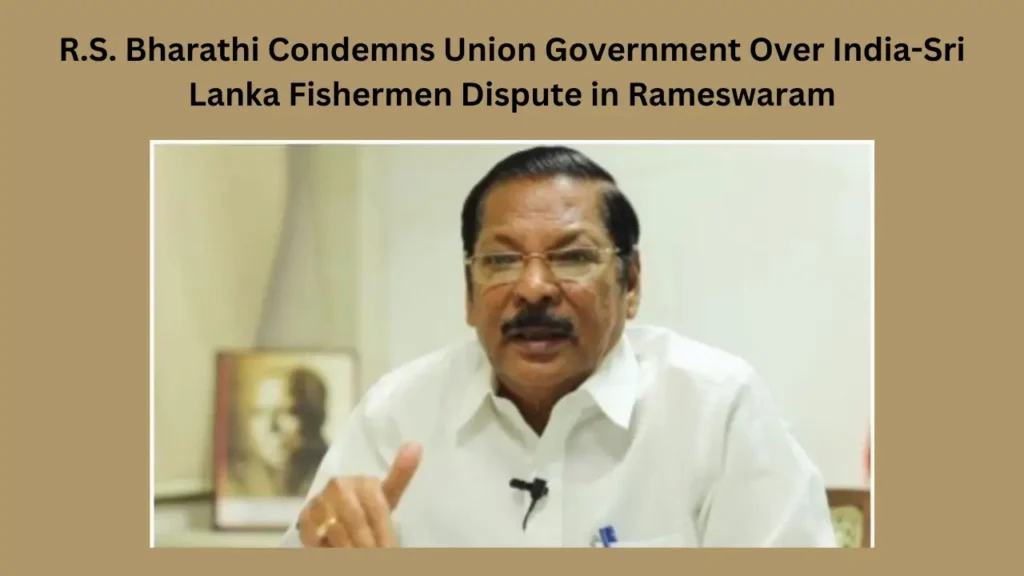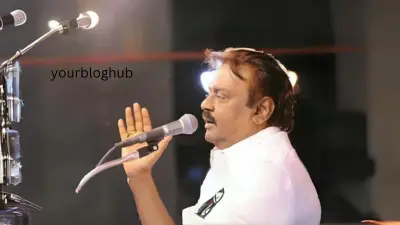DMK leader R.S. Bharathi is strongly criticizing the Union government for how it’s dealing with the India-Sri Lanka fishermen dispute in Rameswaram. This article explores Bharathi’s concerns and the broader impact of the government’s actions on the ongoing issue.

Sri Lankan Navy personnel arrested fishermen in Tamil Nadu on “false” charges of poaching. Prime Minister Narendra Modi sent ₹34,000 crore to help the “ailing” island nation, DMK organizing secretary R.S. Bharathi said at Rameswaram on Sunday, February 11, 2024. He said that the Union government should have stepped in to help the fishermen but didn’t.
At a protest meeting put together by the party’s fishermen wing in Ramanathapuram district, which also had leaders from Kanniyakumari, Thoothukudi, Pudukottai, and Nagapattinam districts, he said that the BJP government wasn’t protecting the fishermen but instead using the Ram Temple for politics.
42 fishermen were arrested in two separate incidents from Rameswaram in the last two weeks. When Tamil Nadu Chief Minister M.K. Stalin told the DMK MPs to bring up the problem in Parliament, it was “disallowed” and the session was instead used to talk about the Ram Temple.
The prime minister just recently came to Rameswaram and went to a few temples. He refused to meet with the leaders of the fishermen while the problem was still hot. He said that this showed “arrogance” and little respect for the poor people of Tamil Nadu. He also said that the Sri Lankan Navy had caught 3,076 fishermen in the last ten years. The more than 500 trawlers were also seized and not given back.
He also said bad things about the Prime Minister and said that when floods destroyed many areas in Tamil Nadu, the Union government refused to help and instead sent help to Sri Lanka, which then arrested the fishermen from here.
People in Tamil Nadu would never vote for the BJP because it was against Tamils and led them astray with false claims. He said that the people here had voted for Muthuramalingam (DMK). In Tiruchendur, they had voted for Anita Radhakrishnan.
Hence, the BJP has no place in Tamil Nadu and very soon, they would be shown doors in other States as well in the ensuing Lok Sabha polls, Mr. Bharathi said and hoped that a new government at the Centre would bring in a change for good for the fishers.
The DMK leader further said that in 2016, the Sri Lankan Navy opened fire in mid-sea and killed a fisherman from Tamil Nadu. “As a result, the country was now suffering due to failing economy there. Anyone, who hated Tamils or attacked the people from this land of Periyar, would suffer for sure,” he said.
The Union Finance Minister Nirmala Sitharaman also came in for criticism in the meeting. Speakers said that she gave tall promises on giving help to the fishermen community, but did nothing. There were aplenty of problems on the GST regime too, which were hitting the common man very much. In a word, the BJP government was in power to help only their “friends” by getting contracts in Sri Lanka, they charged.
What are the issues here?
The various dimensions of the fishermen problem between India and Sri Lanka can be encapsulated as follows:
Issue over Sovereignty
International borders in the Palk Bay, the Gulf of Mannar, and the Bay of Bengal were established by the maritime boundary accords of 1974 and 1976, respectively.
The two governments came to their conclusion in the interest of good neighborliness, but because the parties involved—fischerman—were not consulted, the agreements did not accurately represent the situation on the ground.
The foundation of both agreements was the idea of national sovereignty.
The good outcome was made possible by the intimate personal friendship that existed between both prime leaders, Sirimavo Bandaranaike and Indira Gandhi.
But from Tamil Nadu’s point of view, it was a serious blunder to give up the island of Katchatheevu in Palk Bay to Sri Lanka.
Poaching and Trawling
The misuse of mechanized trawlers in Palk Bay and the detrimental consequences of trawling on the environment and the economy are the main causes of the conflict surrounding Katchatheevu.
The Indian government started a drastic overhaul of fishing methods in an effort to raise output and enhance exports. Trawlers were introduced as a result.
Many people from non-fishing communities invested in this profitable industry because of the quick returns on prawns. Many fisherman ended up becoming wage workers as a result.
Since then, trawlers have earned the nicknames “bulldozers mowing down fish and other benthic species” and “hoovers of the shelf bottom.”
Fish disappeared from the Indian side of Palk Bay soon after they were introduced.
Tougher laws
Following a brief period of reprieve in recent years, Sri Lanka enacted stricter regulations outlawing bottom trawling and imposing steep fines on anyone found to be trespassing on foreign vessels.
Since Sri Lanka revised the Foreign Fisheries Boats Regulation Act to increase the fines on Indian vessels detected fishing in Sri Lankan waters to a minimum of LKR 6 million (about ₹25 lakh) and a maximum of LKR 175 million (roughly ₹17.5 Crore), crossing the IMBL now carries a larger risk.
Fisherman’s concerns
Due to the depletion of fisheries on the Indian side, Indian fishermen enter Sri Lankan waters, depriving their counterparts of a means of subsistence.
Even though there is a chance they could be apprehended or killed by the Sri Lankan Navy, they knowingly breach the territorial waters.
Due to poaching by their Tamil Nadu compatriots, fisherman in Sri Lanka who are situated along Palk Bay are worried about a similar depletion on their side.
In addition to implementing the prohibition on trawlers, the Sri Lankan Navy has increased its coastal surveillance, particularly in areas close to India. The goal is to stop any re-entry onto the island by surviving militants.
Related news:- click here



